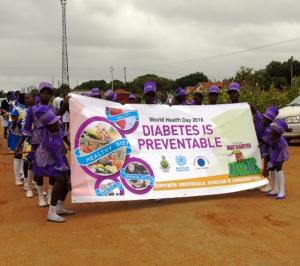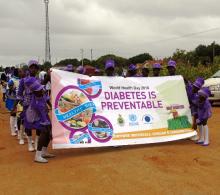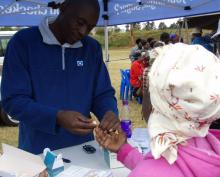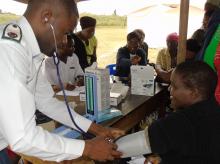Zimbabweans urged to shun fast foods to prevent diabetes
Chegutu, 7 April 2016 - The call was made during the commemoration of World Health Day which was held at Pfupajena Stadium in Chegutu, Mashonaland West Province. Zimbabwe today joined the rest of the world in commemorating World Health Day under the theme Diabetes is preventable: Empower individuals, families and communities.
The theme introduces a major campaign to increase public awareness about the rise in diabetes and its staggering burden and consequences. The commemoration, which was attended by key players in the Non Communicable Diseases cluster, UN agencies, and the Chegutu community also offered screening for diabetes and blood pressure, and talks on eating a healthy diet to significantly reduce the risk of diabetes.
The diabetes epidemic is steadily increasing in many countries, with documented dramatic increases in low- and middle-income countries. In 2012, it is estimated that diabetes was the direct cause of some 1.5 million deaths, with more than 80% of those occurring in low- and middle-income countries. WHO projects that diabetes will be the 7th leading cause of death by 2030.
Speakers at the commemoration urged people to make informed lifestyle decisions that will significantly reduce the risk of diabetes. In a statement, the Honorable Minister of Health and Child Care, Dr David Parirenyatwa urged every Zimbabwean, to make simple lifestyle changes like shunning fast foods, maintaining normal body weight, engaging in regular physical activity and eating a healthy and wholesome diet if Zimbabwe is to attain the SDG target to reduce premature mortality from NCDs – including diabetes – by one third by 2030. “The goal of this commemoration is therefore to increase awareness about the rise in diabetes incidence and to trigger a set of specific effective and affordable actions to tackle diabetes,” said Dr Parirenyatwa
The same sentiments were echoed by WR/Zimbabwe, Dr David Okello. In his speech, Dr Okello highlighted 4 key messages:
- A large proportion of diabetes cases are preventable;
- For those already with the disease, diabetes can be controlled and managed to prevent complications
- Diabetes is not just a health issue—it imposes a substantial public health and socioeconomic burden to people with it; and
- Not enough attention is being given to diabetes and other emerging non-communicable diseases – both locally and internationally. The true burden of NCDs is largely unknown, particularly in developing countries, thereby presenting a challenge in appropriate deployment of interventions. “For effective planning of response, we first need to have a full picture of the true burden of NCDS in the country,” said Dr Okello.
He urged the Government, through the Ministry of Health and Child Care, and development partners working in health to improve diagnostic services for diabetes, and to ensure regular availability of insulin and other oral hypoglycemic agents for treatment, and also reaffirmed WHO’s availability to support the Ministry of Health and Child Care in crafting appropriate policies and strategies for the prevention and control of NCDs, as well as developing guidelines for the management of specific NCDs including diabetes.
___________________________________________
For more information, please contact:
JULIAS Wendy, Email: juliasw [at] who.int (juliasw[at]who[dot]int)








